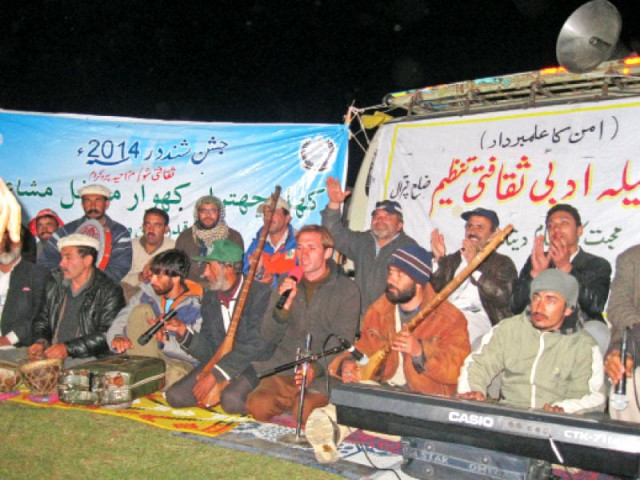Rat pack: The Haqiqat behind Chitrali music
The folk band performs for free and shows up without invitation just to keep their traditional music alive.

Rat pack: The Haqiqat behind Chitrali music
A rag tag folk band called Haqiqat, replete with a jerrycan percussionist, has been keeping Chitrali folk music on the respirator and out of the coffin.
The band has been performing pro bono music-saving services for years now. According to its members, Haqiqat has been performing at weddings and other festive occasions without a dime tossed in its coffers. Instead, it is fuelled by the unsolicited crowd it draws—people only need to know that Haqiqat is about to drop a tune for them to come together in a flash concert of sorts.
Case in point, their concert at the Shandur polo ground, held during the polo festival, went on well beyond 1am, with music so beautiful that even those unfamiliar with the genre were on their feet, swaying and dancing to the vocals, teen-tara, synth, and percussion combo. With fragrant daigs dotting the venue, the atmosphere was like any festival—therapeutic for both the body and the soul.
“The band always strives to keep Chitrali folk music alive; it is still the only music truly liked by the people of the area,” Ansar Illahi, one of the vocalists of the band, told The Express Tribune.
Pashto-centric
In spite of their popularity—evident from the number of people in attendance from Shandur, Mastuj and other mountainous areas—band members complained the government has historically overlooked them. Whether it is the Shandur Polo Festival or any other such event organised in Chitral, the Khyber-Pakhtunkhwa government bears the cost of flying in Pashto-speaking musicians from Peshawar rather than promote Chitrali music or talent.
Even at Shandur, Haqiqat performed without taking any money—they rarely do—and they also came without being invited.
According to members of the audience, this is the music they want the government to not ignore. These are the chords which resonate enough for locals to get up and dance. Like the Attan dance, Chitralis break into their own moves: the Anaphari, Wawali, Tatali, Chon Rasihi and Barwazi to name a few.
With two teen-taras, a keyboard, Chitrali bongos, a jerrycan percussionist and vocalists, Haqiqat claims to stay true to the original form of folk music which has existed for centuries. By doing so, the band is almost performing a public service, to preserve oral and non-artefact heritage.
“Performing our own folk music and keeping it alive is always my first priority,” Illahi reiterated. Also a lyricist, he proudly tells The Express Tribune about his performances across Chitral.
Somewhat a romantic, one of Illahi’s famous numbers loosely translates to “Meray liyay muhabat nasha hai” or “I’m addicted to love”.
Not just a love song
Shehzada is an actor and well-known comedian who also plays the Chitrali bongos for Haqiqat. Although his other work such as music videos and dramas are based on current social issues, his music is true to its times, he said.
“This is our real culture which we have kept pure for thousands of years,” said Shehzada. “We express our feelings through our music, our music which people enjoy.”
Delving into the era of royal patronage, Shehzada discusses the importance of musicians and bands throughout history. “There would always be bands of musicians at the royal court,” said Shehzada. Music was so important that music would herald each morning at the royal court, he said.
In Chitral’s royal years, Shehzada said, music would be performed after dinner and at polo matches at Shandur.
“Of course musicians were called upon to play at weddings, but music was not reserved for festive occasions alone,” said the member of Haqiqat. “It was also used to announce battles during wars,” said Shehzada, “but of course, that was a different type of music.”
In addition to Haqiqat, Chitral boasts several famous musicians, including Mohsin Hayat and Mehtab Khan, who have earned a name for their area with performances across the province.
During one of the breaks at the concert, hundreds gathered around the musicians of Haqiqat.
“This is our music, based on our own cultural values, which has become our identity,” said one of the band’s many fans at the venue, Fayaz Ahmad.
“People from around the country come here to soak up our culture; we have to keep it alive for generations to come.”
Published in The Express Tribune, August 3rd, 2014.













COMMENTS
Comments are moderated and generally will be posted if they are on-topic and not abusive.
For more information, please see our Comments FAQ